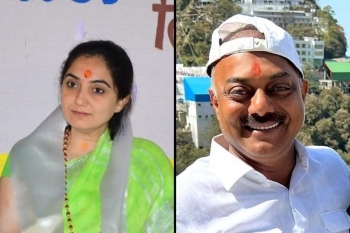
.png) Dr Suresh Mathew
Dr Suresh Mathew

India is passing through an unprecedented situation. The Hindu right-wing leaders and activists are aggressively spewing venom against minority communities, Muslims bearing the maximum brunt. Though the Sangh Parivar groups have pulled out all stops in their vicious attacks, yet the latest round of ‘shots’ has spiraled out of control and gone too far. The malicious remarks against Prophet Mohammad by two BJP leaders have led to unprecedented reaction from the international community. The response of the Gulf nations has sent shivers down the spine of the BJP government which apologised for the uncouth utterances of the ruling party leaders.
The fast-moving developments, which stained the very reputation of the country at international level, raise several unsavory questions. How could the two known faces of the BJP muster courage to malign the Prophet? The answer lies in the unalloyed support the saffron brigade is getting from the present regime. Several BJP and Sangh Parivar leaders have been going for the throat of the minorities with impunity since the present regime came to power at the Centre. There had been belligerent calls to take up arms to get rid of minority communities and some leaders had even set deadlines for getting such work done. Sadly, neither the saffron party nor the government made any serious efforts to rein in those elements, some of whom are national-level leaders of the party. This supplied further oxygen to the right-wing fire to spread to leaders of lower levels and activists. Ironically, the party and its leaders who kept a deadening silence over attacks on minorities and even garlanded those convicted of lynching Muslims have been forced to kowtow to Muslim nations, a heavy price paid for the majoritarian vote bank politics. The BJP had to go to the extent of shamelessly calling their leaders as ‘fringe elements’ to placate the Gulf nations.
The country has been witnessing ruthless activities aimed at hurting the minorities, especially the Muslims, in the last few years. Slapping sedition charges, evicting hawkers selling non-vegetarian food, bulldozing houses, creating a feverish pitch over controversies like halal meat and azan, laying claim to innumerable number of mosques – all apparently aimed at a particular community – are heartless measures resorted to by the regime. The government could go ahead with such brutish actions as it could counter the domestic resistance with ease. But, in the face of international outrage, it had to bite the dust; it is the cost of treating saffron hardliners with kid gloves.
It is paradoxical for the government to state that it has the highest respect for all religions, but turn a blind eye to the barrage of attacks unleashed on the minority communities. It is not for nothing that the US Commission on International Religious Freedom has named India under “Countries of Particular Concern”, tagging it as one of the worst violators of religious freedoms, along with Nigeria, Iran, North Korea and so on. The US Secretary of State too had recently mentioned the rising attacks on people and places of worship in India. It does not show the government in good light that it had to be prodded by foreign countries to act against its citizens for courting controversy on a religious issue. The ruling party and the government should learn the right lessons from this episode.